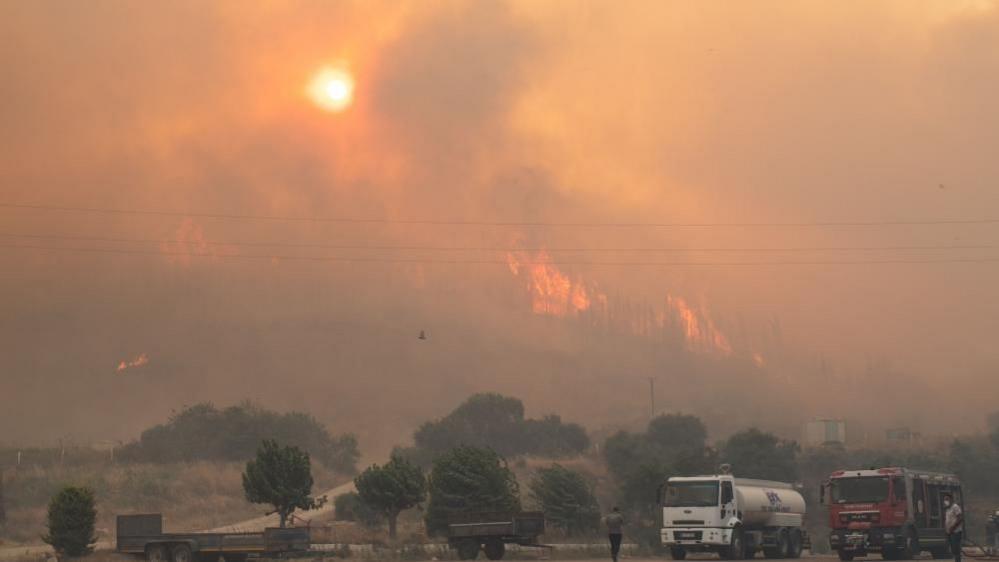'Unprecedented' alerts in France as blistering heat grips Europe
Watch: 'A little bit melting' - Intense heat across Europe
- Published
A record number of heat alerts are in place across France as the country, and other parts of southern and eastern Europe, remain in the grip of soaring temperatures.
Sixteen French regions, including Paris, have been placed on red alert for Tuesday, the country's highest, while 68 others are on orange alert.
On Monday, 84 of 96 mainland regions were under an orange alert, which France's Climate Minister Agnès Pannier-Runacher called an "unprecedented" situation.
Heat warnings are also in place for parts of Spain, Portugal, Italy, Germany, the UK and Balkan countries including Croatia.
Both Spain and Portugal had their hottest June days on record at the weekend.
El Granado in Andalucía saw a temperature of 46C on Saturday, while 46.6C was recorded in the town of Mora in central Portugal on Sunday.
Many countries have emergency medical services on standby and have warned people to stay inside as much as possible.
Nearly 200 schools across France have been closed or partially closed as a result of the heatwave, which has gripped parts of Europe for more than a week now but is expected to peak mid-week.

Festival-goers faced high temperatures at Les Deferlantes music festival in southern France over the weekend
France's red alert will come into effect at 12:00 local time on Tuesday.
Several forest fires broke out in the southern Corbières mountain range on Sunday, leading to evacuations and the closure of a motorway. The fires have since been contained, officials told French media.
Meanwhile, 21 Italian cities are also on the highest alert, including Rome, Milan and Venice, as is Sardinia.
Mario Guarino, vice-president of the Italian Society of Emergency Medicine, told AFP news agency that hospital emergency departments across the country had reported a 10% increase in heatstroke cases.
Parts of the UK were just shy of being one of the hottest June days ever on Monday.
The highest UK temperature of the day was recorded at Heathrow Airport in London at 33.1C. Meanwhile, Wimbledon recorded a temperature of 32.9C, the tennis tournament's hottest opening day on record.
Meanwhile, heat alerts across Spain, which is on course to record its hottest June on record, remained in place.
"I can't sleep well and have insomnia. I also get heat strokes, I stop eating and I just can't focus," Anabel Sanchez, 21, told Reuters news agency in Seville.
It is a similar situation in Portugal, where seven districts, including the capital, Lisbon, are on the highest alert level.
In Germany, the country's meteorological service warned that temperatures could reach almost 38C on Tuesday and Wednesday - further potentially record-breaking temperatures.
The heatwave lowered levels in the Rhine River - a major shipping route - limiting the amount cargo ships can transport and raising freighting costs.

Germany is one of a number of European countries with health alerts in place as temperatures soared in recent days
Countries in and around the Balkans have also been struggling with the intense heat, although temperatures have begun to cool.
In Turkey, rescuers evacuated more than 50,000 people - mostly from the resort city of Izmir in the country's west - as firefighters continued to put out hundreds of wildfires that had broken out in recent days.
The fires were fuelled by winds of 120km/h (75 mph) and destroyed at least 20 homes.
Wildfires also broke out in Croatia, where red heat warnings are in place for coastal areas. An extreme temperature alert was issued for neighbouring Montenegro.

Residents have been evacuated near the resort city of Izmir in Turkey as wildfires rage
Temperatures in Greece have been approaching 40C for several days and coastal towns near the capital Athens last week erupted in flames that destroyed homes - forcing people to evacuate.
On Wednesday, Serbia reported its hottest day since records began, and the meteorological service warned on Monday that "severe and extreme drought conditions prevail" in much of the country.
A record 38.8C was recorded in Sarajevo, the capital of Bosnia and Herzegovina on Thursday. In Slovenia, the hottest-ever June temperature was recorded on Saturday.
The temperature in North Macedonia's capital, Skopje, reached 42C on Friday - and are expected to continue in that range.
Watch: The weather forecast across Europe
While the heatwave is a potential health issue, it is also impacting the environment. Higher temperatures in the Adriatic Sea are encouraging invasive species such as the poisonous lionfish, while also causing further stress on alpine glaciers that are already shrinking at record rates.
The UN's human rights chief, Volker Turk, warned on Monday that the heatwave highlighted the need for climate adaptation - moving away from practices and energy sources, such as fossil fuels, which are the main cause of climate change.
"Rising temperatures, rising seas, floods, droughts, and wildfires threaten our rights to life, to health, to a clean, healthy and sustainable environment, and much more," he told the UN's Human Rights Council.
Heatwaves are becoming more common due to human-caused climate change, according to the UN's Intergovernmental Panel on Climate Change.
Extreme hot weather will happen more often – and become even more intense - as the planet continues to warm, it has said.
Richard Allan, Professor of Climate Science at the University of Reading in the UK, explained that rising greenhouse gas levels are making it harder for the planet to lose excess heat.
"The warmer, thirstier atmosphere is more effective at drying soils, meaning heatwaves are intensifying, with moderate heat events now becoming extreme."

Sign up for our Future Earth newsletter to keep up with the latest climate and environment stories with the BBC's Justin Rowlatt. Outside the UK? Sign up to our international newsletter here.
Related topics
- Published29 June

- Published28 June
